 Leif Randt (Bild: Joahnnes Puch)
Leif Randt (Bild: Joahnnes Puch)
Leif Randt (D) Jury discussion
The German author Leif Randt read the text "Schwimmender Dunst über Cobycounty". A text which taught some of the jury how one can laugh with fear. Randt was proposed by Alain Claude Sulzer.
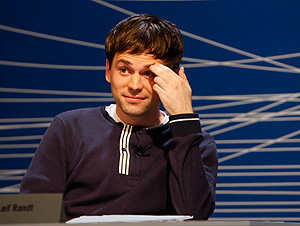 Leif Randt (Bild: Joahnnes Puch)
Leif Randt (Bild: Joahnnes Puch)
Video portrait
Reading
Discussion
Starting with the 65th birthday of the protagonists Wim Endersson's mother, Randy unfolded the panorama of life in "Cobycounty" town. A story about the communal life of the generations of a town, where the "easy life" prevails, a "wellness world" without any highs or lows.
Winkels: "Successful start to the day"
"This is a beautiful and successful start to the day," Hubert Winkels said in his introduction. A text at the "medium frequency wavelength", where everything painful and tragic is "swallowed up" or has been "surgically removed". A world of spas and cruises. Yet, because of its meticulousness, the text was never boring. "A verbal work of art" which is "extremely successful," Winkels said. "We have all experienced this, this is a part of the reality of our lives in lifestyle magazines and the media." The resulting problems are "authentically acted out".
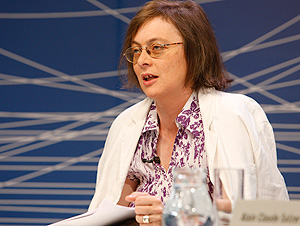 Daniela Striegl (Bild: Johannes Puch)
Daniela Striegl (Bild: Johannes Puch)
Strigl: "Delighted with 'Generation Fruit Basket"
Daniela Strigl was also delighted with the story about the "Generation Fruit Basket", in which she felt a kind of literarisation of the Truman Show had materialised. Only set pieces are spoken here, the young people themselves are already working on a kind of "retrospective trend research". The "jabs" at Leipzig Literature Institute were also great. A "successful satire", while at the same time there is something "very serious" about this "capitalist Utopia of the new man".
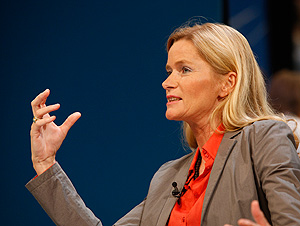 Meike Feßmann (Bild: Johannes Puch)
Meike Feßmann (Bild: Johannes Puch)
Feßmann: "Farce about the 68s generation"
Describing the piece as a "farce about the 68s generation", Meike Feßmann saw similarities to Antonia Baum's text. However, in contrast to that, here the older generation are so relaxed and hedonistic that for the younger generation only melancholy remains. She must ask the question, however, whether the "generation theme " as a "marketing theme" had not gradually become a "simple self-service store". "The text wants to provoke, but it ultimately dismantles itself," said Feßmann.
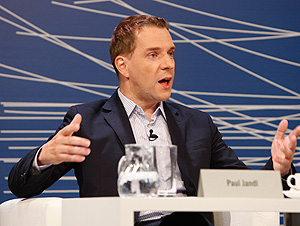 Paul Jandl (Bild: Johannes Puch)
Paul Jandl (Bild: Johannes Puch)
Jandl missed the authenticity
Paul Jandl began by reflecting on the spacial requirements of the text. The narrator tells his and the older generation's story mostly in quotes. What Jandl felt was missing was the authenticity of the story, which creates connections to Wim Wenders, Stephen Soderbergh and Holden Caulfielde, but seems itself not to have a solid basis. "What have we learned? Where is the ontological core of the text (NB: refers to the lesson, the existence)?"
Keller: "World reduced to the superficial"
"But that's precisely the point," said Hildegard E. Keller, disagreeing with her colleagues. The world is reduced to a pure surface here, this is a pure lifestyle, a celebration of the superficial. There is only success every time, but nothing has a chance in reality.
"Yes, but is it not the text itself that become a mere surface?" Jandl suggested. "It is a secondary life through and through", was Kellers answer.
Hubert Winkels joined the discussion: The story is "dystopia in the form of utopia", the amusement is what in reality is "painful". "The audience had also little pain", said Keller.
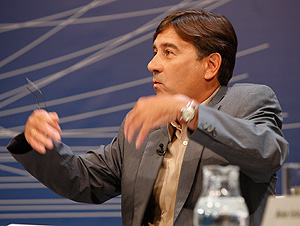 Alain Claude Sulzer (Bild: Johannes Puch)
Alain Claude Sulzer (Bild: Johannes Puch)
Sulzer: "a perfectly made text"
Alain Claude Sulzer, who had invited the text, began to analyse it: it was a "perfectly made text" about "globalisation come true" and a "sedated society" in its perfection , in which, however, the first "irritating factors" start to appear.
"An island, it could also be Berlin in ten years," said Sulzer about Randts science fiction story. The society shown here was close to collapse.
"But that's unchallenging," said Paul Jandl, still unconvinced.
Spinnen: "Ironic text through and through"
"Of course," said Burkhard Spinnen. It is almost a "classic affair" - "how can this continue for 400 pages?" An ironic text through and through. "Beautiful, funny, entertaining - but this is precisely the problem", said Spinnen, because in the mind of the protagonist this world is actually not ironic.
Strigl: "One is afraid and can laugh about it"
"The text remains at the surface of its coolness, which is later exhibited more" said Jandl. Daniela Strigl disagreed: one should not criticize the text but the competence of its narrator. Distance and irony are being used here. "This world already teaches me the meaning of fear - when the highlight of individuality is not to attend yoga class - I find that fantastic," said Strigl. "One is afraid, yet can laugh at the same time."
Barbara Johanna Frank
 TDDL 2011
TDDL 2011